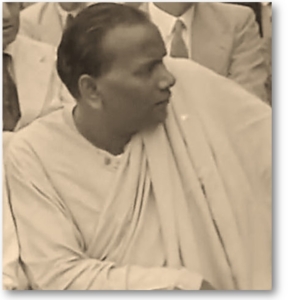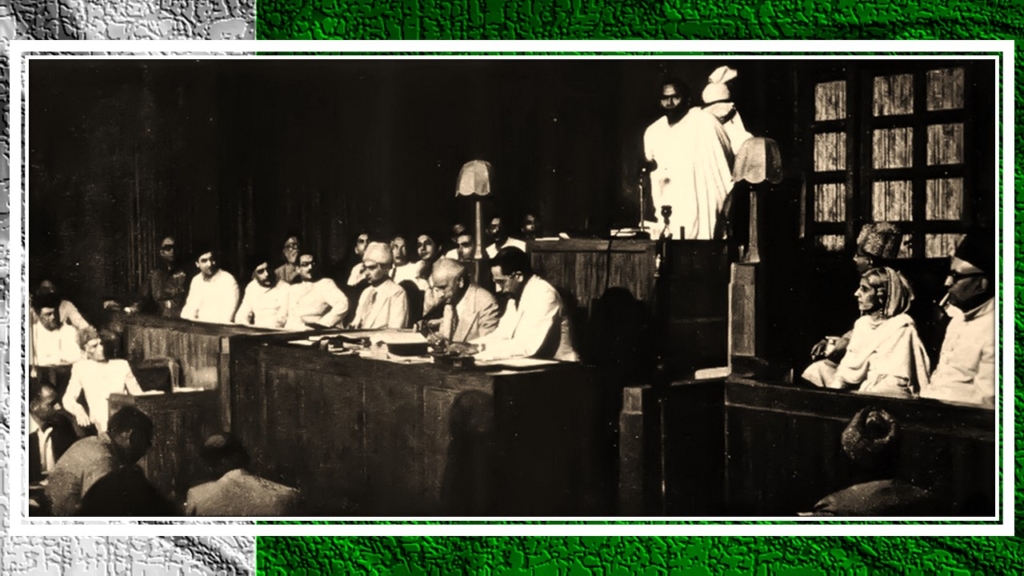The inaugural address in the first Constituent Assembly of Pakistan was delivered by a scheduled caste Hindu and not by Quaid-i-Azam Muhammad Ali Jinnah, contrary to the widespread misconception. Here is a summary of proceedings and a complete transcript of the address.
The constituent assembly of yet to be born Pakistan met for the first time at 10 am on Sunday, 10 August 1947, in Karachi. According to the record, the first line ever spoken was by Liaquat Ali Khan, who said:
Ladies and Gentlemen! I propose that Mr. Jogendra Nath Mandal be elected as temporary Chairman.
This was followed by a line from Khwaja Nazimuddin:
I beg to second the proposal.
Jogendra Nath Mandal took the chair and delivered a speech. He was a scheduled caste Hindu from Bengal and a minister in the cabinet of the All-India Muslim League. It is the speech delivered by him on this occasion, and not the one by Jinnah the next day, which has gone into the record as ‘Chairman’s Inaugural Address’.
The following is the complete transcript.
Chairman’s Inaugural Address
Ladies and Gentlemen! At the very outset I would like to bow down my head to God Almighty for the opportunity He has graciously given us to assemble here and pray to Him to guide us on the right path.
Then, I thank you, ladies and gentlemen, most cordially for the great honour you have done me by electing me as the Chairman of the historical, first, inaugural meeting of the Constituent Assembly of Pakistan.
You have come from different Provinces of the State of Pakistan and have assembled here on this momentous occasion with the object mainly of framing a constitution for the free, Sovereign State of Pakistan.
Gentlemen, it is hardly necessary for me to impress upon you the gravity and solemnity of the occasion. I hope you will agree with me when I say that the free independent State of Pakistan will bring to one and all of her citizens prosperity, happiness and peace. (Hear, hear.)
I believe, and it is my firm conviction that the State of Pakistan will be one of the most powerful, resourceful and magnificent States of the world. (Applause.)
Ladies and gentlemen, I cannot help expressing on this momentous occasion my gratitude and admiration and the gratitude and admiration of the Muslims of India towards Quaid-i-Azam Mr. Mohammad Ali Jinnah, the great creator and architect of the State of Pakistan. (Applause.)
I have every confidence that under his able leadership, under his astute statesmanship and through his untiring devotion to the cause of Pakistan, all prosperity and happiness will come to the people of Pakistan. It is needless for me to reiterate that the Quaid-i-Azam, Mr. Mohammad Ali Jinnah, is the greatest statesman and one of the greatest men of the world today. (Prolonged applause.)
Today, gentlemen, it gives me much pleasure to declare that the election as Chairman of a member from a minority community augurs very well with the creation of Pakistan, because Pakistan today is the result of persistent and legitimate demand of the minority community, namely, Muslims of India.
I would like to point out that not only will the people of Pakistan and India but the people of the whole world look to the Pakistan Constituent Assembly and find for themselves that the Muslim community which was determined to acquire their legitimate rights and privileges and determined to have a separate State of Pakistan will never lack in the quality of doing not only justice and fairness but acts of generosity towards the people of minority communities inhabiting Pakistan, and that is my greatest satisfaction.
People of minority communities in Pakistan may be assured, as they have been assured repeatedly by the Muslim League leaders, and particularly Quaid-i-Azam Mr. Mohammad Ali Jinnah, that the people of minority communities would not only be treated justly and fairly but generously too.
Now, gentlemen, as I have said, we know the solemnity and gravity of the occasion. We know our rights and privileges. At the same time, we should know our duties and responsibility.
To ask for protection, safeguards and privileges of a State by the people of the minority communities devolves on them a responsibility to be loyal and faithful to the State. Unless a minority people are loyal and faithful to the State they have little justification to demand safeguards, protection and fair treatment.
I would, therefore, like to make it perfectly clear that the people of minority communities are required to change their outlook and people of all communities living in Pakistan should now trust one another. The distrust, hatred, enmity and jealousy should be replaced by trust, love, friendship and mutual co-operation.
I think it is not an occasion for me to inflict upon you a longer speech. Therefore, I should now close with this appeal again to you, ladies and gentlemen, that you should bear in mind that this Assembly as a sovereign body has got all power and right to do whatever it wants to do.
Although the secondary function of this Assembly will be to enact legislation till a Central Legislative Assembly is constituted under the new Act, the main function of this Constituent Assembly will be to frame a constitution for the State of Pakistan and I hope and believe that Honourable Members representing different provinces of the Pakistan State and representing different communities will try to evolve and frame an ideal constitution for Pakistan.
I would like to make another appeal that we should start without any prejudice and any bias. We should only look for what is good and not imitate what is done here or elsewhere. Our endeavour should be to frame one of the best constitutions that any world state has ever produced and I am sure we shall do it.
I again thank you most cordially, ladies and gentlemen, for the great honour you have done me. (Loud applause.)
Presentation of credentials and signing of the register
 According to the record of proceedings, Mandal was naturally the first to present his credentials for membersgip of the assembly and sign his name in the register – first among equals, in a literal sense.
According to the record of proceedings, Mandal was naturally the first to present his credentials for membersgip of the assembly and sign his name in the register – first among equals, in a literal sense.
Jinnah, Liaquat and Nazimuddin followed him as second, third and fourth, respectively.
Some formal resolutions were then adopted and it was decided that nominations for the president of the assembly should be submitted to Mandal by 4 pm.
The assembly was then adjourned till the next day, the name of Jinnah was formally submitted, and there was evening, and there was morning – the first day, of the Constituent Assembly of Pakistan, a day that needs to be remembered for every reason.
Note: Transcript of the entire session is included in the Constituent Assembly Debates. Download PDF from the website of the National Assembly of Pakistan.

Greetings Khurram sahab.
Hopefully your work will bring into light the hidden aspects. If only, we as a nation were taught all this at younger age, what a diverse and historically aware new generation we would have had today.
History is always a victim of selective writings. May be ypur efforts will correct some of the misconceptions we as a nation have. I’d suggest that you broaden your research and include a critical evaluation of two nation theory as a rebuttal to the proponents of “batwara” perspective – for it was freedom after all, not batwara as they call it.
His choice of words is impressive. I especially liked this part, “We should only look for what is good and not imitate what is done here or elsewhere.”.
where is this genuinity and selflessness? Where is this spirit?